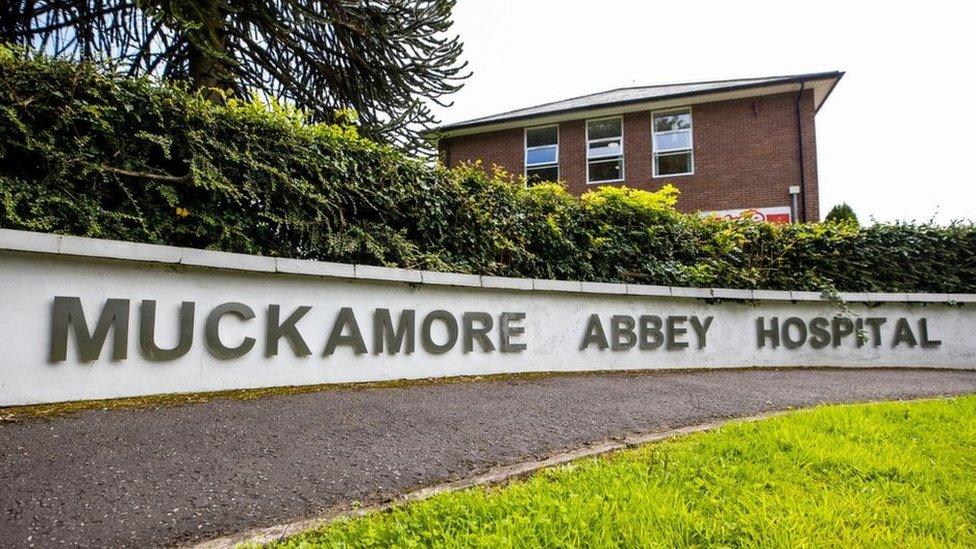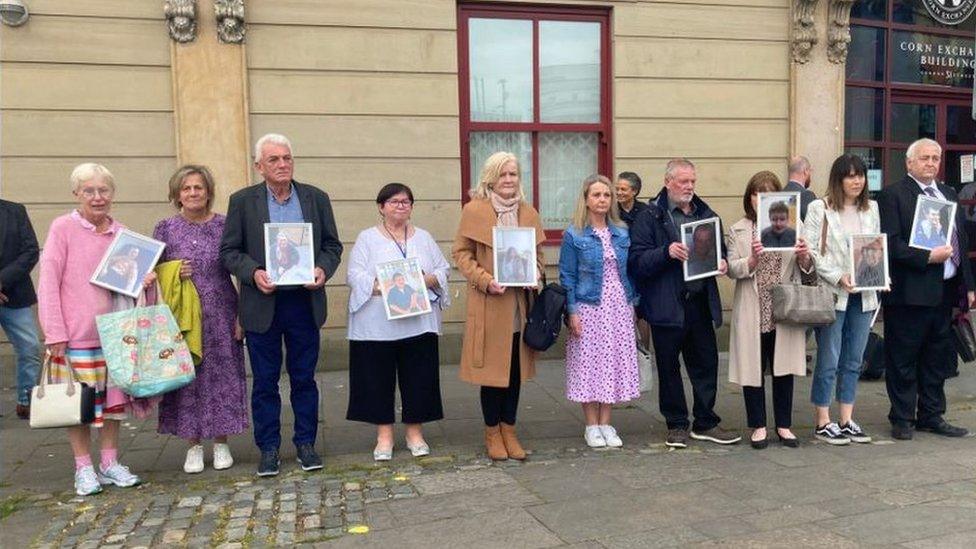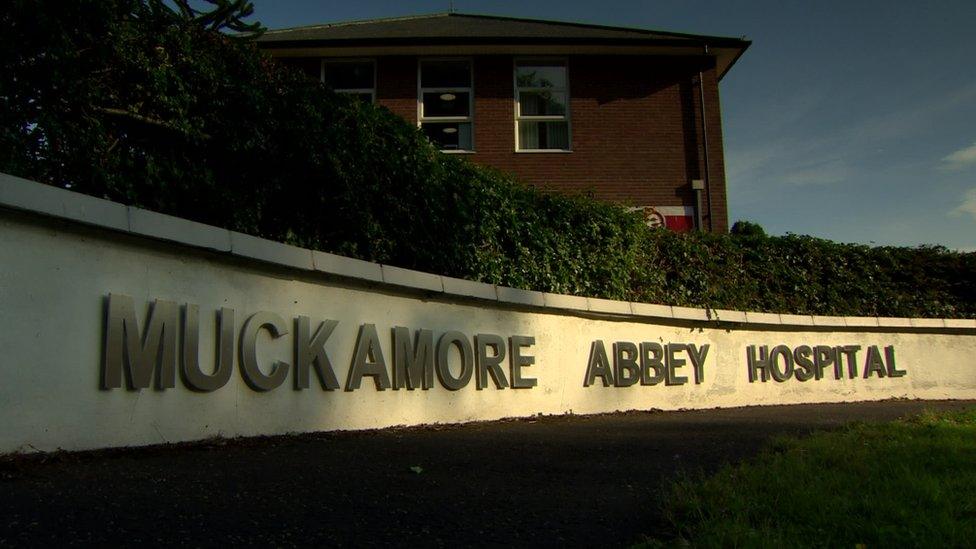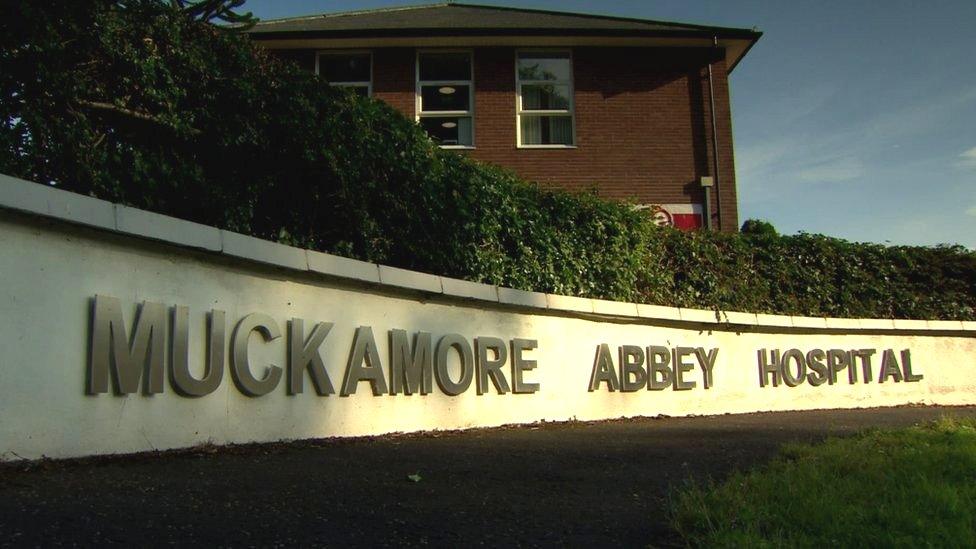Muckamore: Daughter's death 'preventable,' says ex-patient's mum
- Published

Muckamore Abbey Hospital is at the centre of the UK's biggest ever police investigation into the abuse of vulnerable adults
The mother of a former Muckamore Abbey Hospital patient says she believes her daughter's death could have been prevented if there had been proper procedures around her feeding needs.
The public inquiry into allegations of abuse of patients at the hospital is hearing evidence.
Tara told a the inquiry that her daughter, Ashley, should have been classified as "very high risk".
She cited incidents where she aspirated and inhaled vomit into her lungs.
Ashley, who had learning difficulties and health conditions, was first admitted to Muckamore in February 2013 when she was 25.
'Such poor condition'
Tara told the inquiry her daughter was admitted from a care home, where she had been in respite, after her physical and mental health deteriorated.
She was non-verbal and required assistance for all personal care, including eating.
She added staff at the care home told her Ashley needed nursing care, which they could not provide, and that she would be sectioned under the Mental Health Act.
Her mother told the inquiry she received a phone call from Muckamore, days after her daughter was admitted, informing her that Ashley had a fractured toe.
Tara said her daughter had previous issues with her toes and that she was not sure whether the fracture had been sustained in the care home or at Muckamore.
Ashley's mother was advised it was in such poor condition that it needed to be removed.
She told the inquiry on the day of the operation her daughter was taken immediately to the intensive care unit at the Royal Victoria Hospital as she had "aspirated and inhaled vomit in both her lungs".

Relatives of patients at Muckamore Abbey Hospital have given evidence to the public inquiry
Tara said her daughter's clothes were covered in the remnants of Weetabix and vomit and that she was drifting in and out of consciousness.
She added a doctor told her Ashley was "dangerously ill and needed to be ventilated as her oxygen levels were so low".
The operation to remove Ashley's toe was carried out, but her mother said she did not have "any information" as to why her daughter was sick on the morning before the procedure.
She added that she did not know if Ashley had been "assisted or supervised" while eating breakfast or if the Weetabix had been "prepared properly."
Tara also questioned why her daughter was having breakfast if she was on her way to hospital for an operation.
Tara told the inquiry about two further incidents where her daughter aspirated and had to receive hospital treatment.
The inquiry heard that Ashley's family were advised in June 2013 that she was "very ill" and that medical staff were going to start palliative care.
She died on 26 November 2013 at Antrim Area Hospital.
'No one explained what happened'
Her mother told the inquiry she believed the first aspiration "eventually caused her death".
"We've never had an explanation as to why she aspirated in Muckamore Abbey Hospital on the first occasion or any of the other occasions," she said.
"Ashley's case of death on her death certificate was aspiration pneumonia," she added.
"No one has explained to us what happened as far as we're aware, no one has investigated Ashley's death."
Tara told the inquiry that her daughter's "feeding needs were part of her medical notes and records" and that Ashley should have been classified as "very high risk" following the first incident.
"If you have aspirated once you are at very high risk of doing so again, you cannot ever get all of the fluid and vomit out of the lungs properly and it can cause serious health issues," she said.
"I believe if she had not aspirated then she would still be alive and this could have been prevented if the right interventions had been put in place," she added.
Tara said her family "remain very distressed by the events that led to Ashley's death."
She said she wanted answers to her questions and that she had not felt strong enough to ask them before now.
Tara added that she felt guilty that her daughter had to go into respite care, when she was pregnant with twins.
"I feel that if she had not done so then none of this would have happened and she would still be alive today.
"I know there was no choice at the time but I cannot help feeling like this," she said.
Related topics
- Published11 October 2021

- Published6 August 2020
